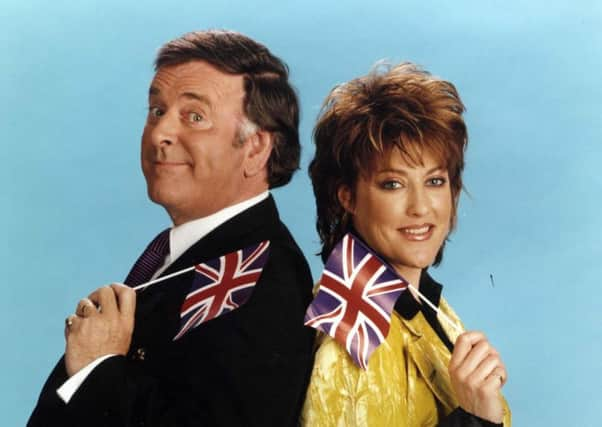Why Morrissey should be Brexit Britain’s Eurovision entry – Martyn McLaughlin


The decision to entrust record label executives with choosing the UK’s next Eurovision entry should not really come as a surprise. If the past three years has taught us anything, it is that allowing the British public to have their say does not always guarantee a successful outcome.
So it is with the long-running musical contest, an event the UK once dominated with a string of marvellously frothy pop hits. Sadly, the fizz has long gone flat and curdled into something the rest of Europe turns its nose up it.
Advertisement
Hide AdAdvertisement
Hide AdFor that reason, the BBC, which by a delightful quirk, remains responsible for managing the UK’s entry via its membership of the European Broadcasting Union, has decided to reinvigorate the recipe – or at the very least, entrust someone else to bring it to the boil.
As of next year, the UK’s representative will no longer be chosen by the viewing public. That burden will instead befall BMG, the record label whose acts include the likes of Kylie Minogue and George Ezra.
By effectively proroguing Eurovision and handing over responsibility to a major record label – one headquartered in Germany no less (no sniggering at the back, Remainers) – the BBC believes the UK could at long last leave behind its wooden spoon and win in the competition for the first time since 1997, when Katrina and the Waves won with Love Shines a Light.
Kate Phillips, the corporation’s entertainment commission controller, described the move as a “genuinely exciting prospect” that demonstrated that its “commitment to finding the right song has never been higher”.
These endorsements make a great deal of sense if the one and only metric that matters is winning, and the resources at BMG’s disposal – particularly its ability to promote the chosen and singer and song – will undoubtedly bolster the profile of the UK entry across Europe.
But all this presupposes that we are taking the entire thing seriously, which has never really been the case, at least not since the UK’s golden years, when Sandi Shaw, Brotherhood of Man, and Bucks Fizz became household names.
The subtext in the BBC and BMG announcement is that a corner has been turned, and the UK will once more be trying to win. We could all do with cheering up, granted, but is it really such a good idea?
Advertisement
Hide AdAdvertisement
Hide AdDespite our grousing and grouching over the UK’s fall from grace at the continent-wide singing contest, it is surely worth asking not only whether the fleeting pleasures of success are all they are made out to be, but whether continuing our losing stream might in fact be more enjoyable.
Griping and grumbling are well-established traits of the British character, and the travesty of Brexit has ratcheted them up a notch. Having been fed a diet of lies, fear and bluster for the best part of six years, we are now masters of grievance. We are nourished by it. What use are our constitutionally enshrined rights if not to cast aspersions on the integrity of the Albanian judges?
If – and it’s a big if, granted – the UK somehow wins, what would we talk about? At offices up and down the country, workers would gather in silence around water coolers, bereft at our moment of glory.
In any case, the decision to entrust BMG with the selection process surely signals a craven attempt to secure victory at all costs and an embrace of professionalism, concepts which should be alien to the glittery, jittery cavalcade that is Eurovision. Other countries may have decided to take a similar approach in recent years, choosing as their representatives seasoned musical acts and talent show winners who are no strangers to the charts. But surely that should encourage modern Britain to do what it does best and swim against the tide of the rest of Europe and dig its own trench... I mean, plough its own furrow?
What better way to project a show of strength and autonomy than to reimagine the canon of George Formby for the 21st century, or perhaps even entrust the grime stars of today to rework a Vera Lynn classic? The possibilities, as successive parliamentary votes have shown, are endless.
According to both the BBC and BBC Studios – the corporation’s commercial offshoot which will produce the television coverage of next May’s 65th iteration of the competition – they share with BMG a vision of finding a song with “broad international appeal” and an artist who “embodies the spirit and values” of the contest.
Quite what this means in practice is, frankly, anyone’s guess, but it is our right – no, our duty – to do just that.
It may have escaped the attention of our Eurovision administrators, but there is at least one eyecatching artist on BMG’s roster who would surely be ideal to project a vision of 21st century Britishness, especially if we crash out of the EU with no deal, embittered and enraged, grasping to our crumbling sovereignty and waving our fists at multicultural values. Yes, the label’s line up includes none other than Morrissey, the former frontman of The Smiths who has embarked on a breathless pursuit to destroy his legacy by supporting far-right, anti-Islam groups, and endorsing Nigel Farage for the job of prime minister.
Advertisement
Hide AdAdvertisement
Hide AdCome next May, when we are all huddled joyously round the one working television in a looted Currys shopfront, and throwing chlorinated chicken legs onto a bonfire as we toast the singer’s unlikely and overdue triumph, remember you read it here first.
